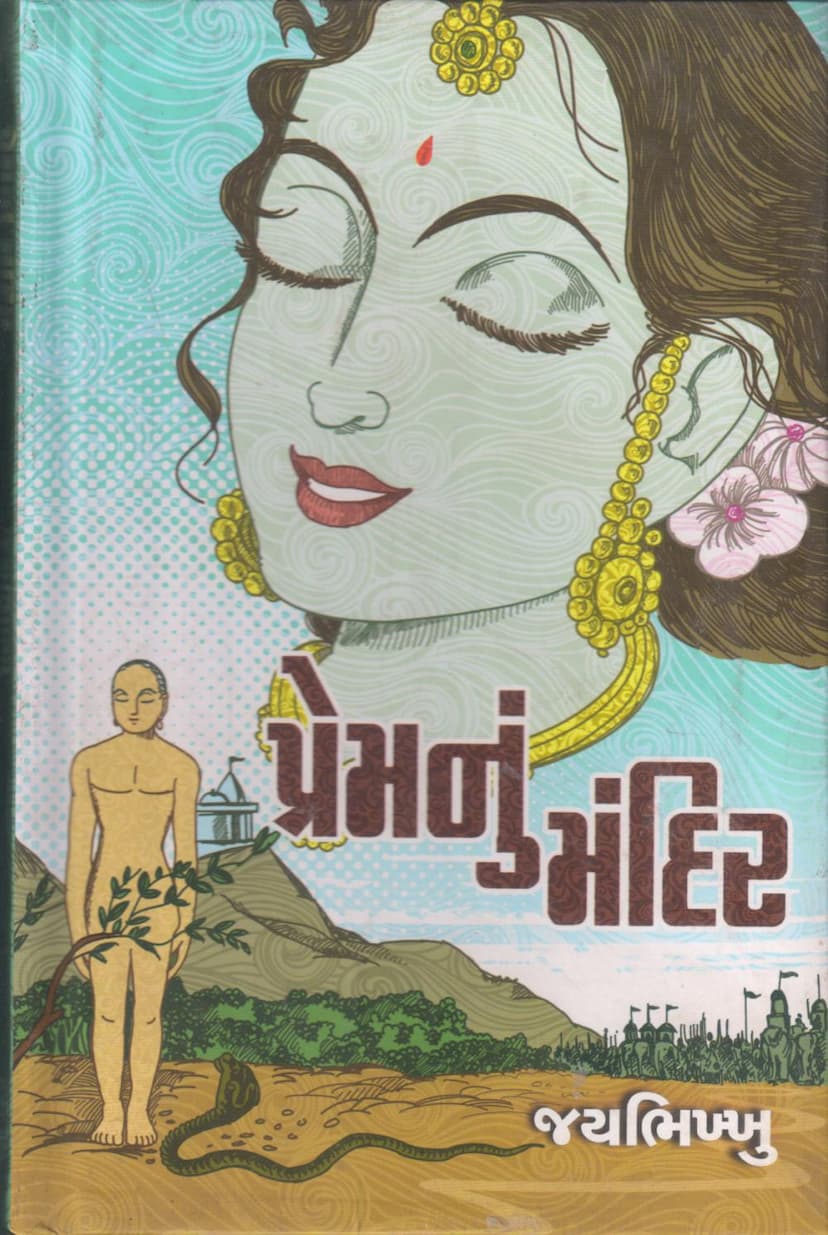Premnu Mandir
Added to library: September 2, 2025

Summary
Here's a comprehensive summary of the Jain text "Premnu Mandir" by Jaibhikkhu, based on the provided pages:
Book Title: Premnu Mandir (The Temple of Love) Author: Jaibhikkhu Publisher: Jaibhikkhu Sahitya Trust
Overall Theme and Purpose:
"Premnu Mandir" is a Gujarati historical novel by Jaibhikkhu. Its core purpose is to advocate for a spiritual path amidst the material complexities of human life. The novel emphasizes that true happiness lies in embracing universal values such as truth, non-violence (ahimsa), multi-faceted reality (anekant), and the synthesis of all religions (sarvadharma samanvay). The author's intention is to inspire humanity to transform hatred and conflict into love, reflecting the aftermath of the atomic bombings of Hiroshima and Nagasaki.
Key Ideas and Concepts:
- The Matsya Nyaya (Law of the Fish) vs. The Temple of Love: The novel begins by referencing the "Matsya Nyaya," where the big fish swallows the small, symbolizing the strong dominating the weak. However, it contrasts this primal law with the ultimate goal of humanity: the "Temple of Love." The narrative explores the struggle between these two forces.
- Spiritual Path for True Happiness: The author suggests that humans, surrounded by material forces, must turn towards spiritual paths to find true happiness, guided by Jain principles like truth, non-violence, anekant, and universal tolerance.
- Jaybhikkhu's Literary Style: The book is praised for its simple, fluid, and meaningful language style, which keeps the reader engaged. The author's philosophical reflections are presented in a way that sometimes feels like independent essays, making historical events relevant to contemporary times.
- Dedication: The novel is dedicated to Param Pujya Shri Namramuniji M.S.A., acknowledging his inspirational message of ahimsa against violence, his encouragement of virtuous effort, and his role in bringing about transformation in young hearts and creating revolution in religion, society, and nation.
- Jaybhikkhu's Legacy and the Trust: The publication is part of the "Jaybhikkhu Janmashatabdi Granthavali" (Jaybhikkhu Centenary Collection), highlighting the author's significant contribution to Gujarati literature. The Jaybhikkhu Sahitya Trust continues to promote humanity and cultural activities through publications and awards.
- The Nature of Stories: The author reflects on the inherent human need for stories, how they connect generations, and how they form a vital part of knowledge transmission and societal development. He categorizes Indian narrative literature into Vedic/Puranic, Buddhist, and Jain streams, noting how similar narratives can be adapted across traditions.
- Critique of Societal Issues: The text touches upon societal problems like the exploitation of the weak, the corrupting influence of power and wealth, the limitations of dogma, and the hypocrisy that can arise within religious or societal structures.
- Character of Jaybhikkhu: Jaybhikkhu is described as a writer who naturally conveyed life's values through his writings, a "life-affirming litterateur" (Jivan-dharmi Sahityakar). He wasn't formally educated in traditional institutions but possessed profound wisdom through reading and contemplation. His work is characterized by courage, straightforwardness, and a deep understanding of human nature and spiritual principles, often drawing from Jain tradition but universalizing its message.
- "Prem Nu Mandir" Specifics: The novel's title itself signifies a central theme. The summary of the first chapter, "Vilochana," introduces the setting of Kaushambi, a prosperous city, and the characters of Vilochana, a wealthy merchant, and Vikramavtar, a soldier. It depicts the post-war atmosphere and the commerce of people, highlighting the transactional nature of society. The narrative then shifts to the internal struggles of characters like Vilochana, who is moved by the plight of a young girl he is compelled to sell.
- Themes of Compassion and Inner Change: The story of Vilochana suggests that even amidst harsh realities and business dealings, acts of compassion can emerge, leading to an internal transformation. The young girl, Chandana, deeply affects Vilochana, making him question the dehumanizing aspects of the slave trade.
- The Role of Character and Fate: The novel explores how characters like Chandana, despite their dire circumstances, retain an inner strength and grace, influencing those around them. The interplay of human agency and destiny is subtly explored.
- Philosophical Underpinnings: The text delves into concepts of karma, self-effort (purusharth), and the influence of past actions (sanskar) on present circumstances, aligning with Jain philosophy.
- Critique of Ritualism: The author subtly criticizes the superficial adherence to rituals without genuine spiritual understanding, highlighting the importance of inner conviction and compassion.
- The Power of Storytelling: The book itself is a testament to the power of storytelling to convey profound messages and inspire change. Jaybhikkhu's ability to weave historical context with philosophical insights and emotional depth is a recurring theme.
In essence, "Premnu Mandir" is a work that uses historical narratives and relatable characters to impart timeless Jain and universal ethical teachings, urging readers to seek inner peace and contribute to a world built on love and compassion.